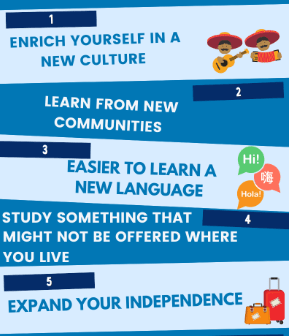Many people believe that a university degree is essential for a successful career. It may lead to greater work prospects, more income, and the ability to pursue hobbies.
However, frequently missed is the opportunity for significant personal development that comes with this life-changing stage. A university education encompasses more than simply academic information acquisition; it is about self-discovery, skill development, and personal development.
In this blog, we will talk about how going to college can improve you as a person, both in terms of your development and the development of traits that improve the lives of people around you.
It Improves Your Everyday Skills
Attending university is about more than just studying. When you attend university and leave home, you are instantly building more of your independence. University is a crucial period when most people will learn valuable life skills and how to take better care of themselves. This includes:
- Preparing meals
- Household chores
- Being more financially independent
- Being more mindful of your routine
- Building your general independence
It Improves Your Social Interaction Skills
University forces you to interact socially on a daily basis. This is a great opportunity to develop your social skills and your ability to communicate better with others. It can leave you feeling more confident in your social skills and transform socially awkward people into those who are more comfortable in a social setting.
You Can Learn Compassion for a Variety of People
When attending university, you will meet people from all different cultures and walks of life. This will help you learn more about others and develop a compassionate understanding of those who are similar to and different from you.
You Can Inspire Others – and Yourself
Career goals and academia are often in line with how you wish to help yourself, help others, and have a positive impact on the world. Seeking further education and developing these skills means you can work hard for yourself and your own goals and also provide benefits to those around you.
Institutions like Marian University Wisconsin are dedicated to offering academic programs that teach core skills and the ability to inspire.
You Will Learn More About Yourself
You truly know who you are once you go out into the world and stand on your own two feet. Attending university helps you to learn more about yourself while also teaching you how to cope with new situations and fulfill your own goals.
You Will Understand How to Overcome Obstacles
A university degree may not be smooth sailing, and you may run into many problems — both academically and personally. Learning how to overcome these and being able to learn from your mistakes, too, will help you to apply this logic to future problems and be able to have more confidence in your problem-solving abilities.
Familiarization with Various Learning Styles
Higher education exposes you to a range of learning styles, from lectures and seminars to group collaborative study to solitary research. The range in approach teaches you to adapt to alternative methods of information processing.
By extension, learning to operate with information in different formats extends your intellectual elasticity to process and internalize novelty more efficiently during and outside academic life. This kind of flexibility will be an extremely valuable resource when you are expected to puzzle through complex problems or need to adjust your approach to something on very short notice.
Development of Emotional Intelligence
University life provides an academic atmosphere for overcoming personal difficulties and also requires you to acquire emotional intelligence, including self-awareness, self-regulation, empathy, and social skills.
Variants of the groups dealing with pressure and conflict resolution develop various shades of emotional maturity. Students quite often face personal growth in such a manner that they learn not only to recognize and deal with their emotions but also to have better interpersonal relationships and communications.
A Larger Sense of Accountability for Your Growth
There is much that comes from your shoulders at the university about your academic growth. Unlike in high school, the learning and organization are done by teachers. In university, you have a great deal of freedom.
With that freedom comes a deep sense of accountability regarding meeting academic deadlines and growing as an individual. You learn to be self-motivating and disciplined in such a manner that sets you up for life through different scenarios. Owning learning builds an intrinsic drive toward bettering yourself, which then seeps into all other facets of your life.
Curiosity and Lifetime Learning
Higher education encourages the development of curiosity, believers in urging students beyond the norm, and performance in learning about subjects that excite their interest. In turn, the sense of curiosity does not restrict itself to books and notes; instead, it becomes a habit-a way of life.
Inculcating this habit of acquiring information and knowledge enrichment can render one a lifelong learner, questing unceasingly to better oneself and to perceive the world with more clarity. This mindset will enforce humility and openness to new ideas, making you versatile, adaptable, and more rounded.
Constructive Feedback and Self-Improvement
Unlike many other stages of life, a university is a place where you are consistently in a structured environment and able to receive constant feedback on your work. Learning to take constructive criticism from professors, peers, or mentors instills humility and teaches the use of feedback for self-improvement.
The refinement and revision processes help you develop a growth mindset, whereby mistakes are opportunities to do better, not failures. This capacity for self-reflection leads to action, which comes from constructive criticism and allows you to grow continuously as a student and a person.
Gaining Confidence in Your Ideas
At university, you are encouraged to think for yourself and present your ideas in essays, projects, or debates. This whole process of intellectual self-expression builds your confidence in your thoughts and opinions.
Even when those ideas are challenged, defending them and engaging in intellectual discussions allows you to create resilience and build a sense of your voice, which can contribute something valuable to larger conversations. This self-assuredness will spill over even outside academia into how you approach the different challenges of life that come your way, from personal decisions to professional ones.
Instills a Strong Sense of Ethics and Integrity
University often puts you in a position, through academic work and real-life experiences, to confront questions concerning ethics and morality: options on how to handle academic integrity, ways to deal with group work challenges, or addressing controversial topics are some aspects that university life offers for developing personal values in all respects.
Working through these moral dilemmas develops a sense of integrity, and the perception of right and wrong is nurtured. University education, therefore, plays an important role in molding you into a person who will strive not only to achieve success but also to attain success ethically in all spheres of life.
Opportunity to Follow Dreams and Create a Purpose
University is one of those few places where you can spend considerable time discovering your passions and cultivating them, either through academic classes, clubs, or personal projects. The university helps you find a direction or a sense of purpose in life.
When you know what drives you, you end up understanding yourself more and more, and that is exactly what shapes everything from career choices to lifestyle decisions. The college will help you align your values with your actions, shaping you into an individual who lives intentionally.
Conclusion
University education goes far beyond academics; it is that experience that shapes you into a better and wiser person. University exposes one to styles of learning, cultures, and people that help further develop a set of distinctive skills—intellectual, emotional, and social—that will make one adaptable, thoughtful, and compassionate.
One will learn to take responsibility for development, be resilient when faced with difficulties, and acquire the qualities of curiosity, ethical integrity, and imagination. These aspects of personal development ensure that you will not only become a better student but also a better individual able to face the continuing challenges of life.

